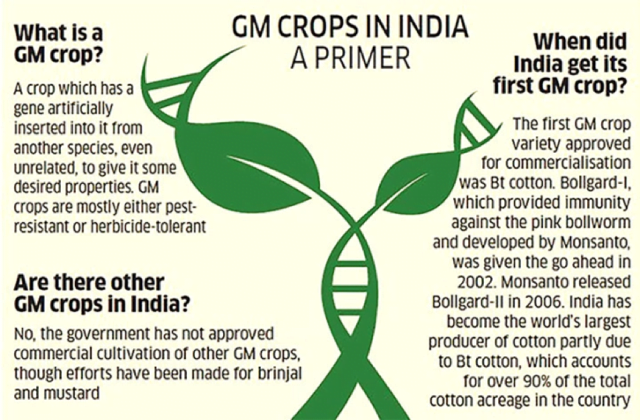[ad_1]
AGRICULTURE/ SCIENCE & TECH/ GOVERNANCE
- GS-2: Issues of food security; Technology missions
- GS-3: Science & Technology- developments and their applications and effects in everyday life.
- GS-:2 Government policies and interventions for development in various sectors
GM soy meal import
In news Union government has decided to allow the import of crushed genetically modified (GM) soybean, which is a major ingredient of poultry feed.
- A GM or transgenic crop is a plant that has a novel combination of genetic material obtained through the use of modern biotechnology.
Need for the decision
- The poultry industry has been crushed by multiple disasters over the last year and a half.
- In January 2020, a false rumour that COVID-19 could be spread by eating chicken meat led to a crash in demand
- A year later, avian flu cases led to another crash, followed by a crippling rise in the prices of poultry feed.
- Rise in soybean process in domestic Indian market had led to the skyrocketing of input costs which led to increase in prices of chicken products in the retail market. Therefore, the demand for import of GM Soya seeds.
About Soy meal and its GM variant
- Soy meal is left over after oil is extracted from the bean.
- It is the main protein ingredient in the feed, especially for broilers (any chicken that is bred and raised specifically for meat production).
- It constitutes 25% of poultry feed and maize constitutes 60%.
- Roundup Ready Soybeans (RR soybeans) are genetically engineered soybeans that have had their DNA altered to allow them to withstand the herbicide glyphosate (the active ingredient in Monsanto’s herbicide Roundup).
- They are also known as “glyphosate tolerant” soybeans.
What is the Status of GM Soyseeds in India?
- India allows the import of GM soybean and canola oil.
- Import of GM soya bean seeds has not been approved in India.
Concerns:
- Environmental activists have raised concerns about the permission given for something derived from a genetically modified plant to enter the human food chain because India’s regulatory system has not yet approved GM foods.
- The Coalition for a GM-Free India, which includes consumer rights groups and sustainable farming groups, termed the decision “highly objectionable and legally untenable (reputable)”.
- It noted that the 1989 rules of the Environment Protection Act applied not just to GM organisms, but also products and substances thereof.
- It is also feared that import of GM soya bean will affect the Indian soya bean industry by contaminating non-GM varieties.
Do You Know?
- The only GM crop approved for cultivation in India is BT cotton. Talks are on to allow Htbt Cotton.
- Bt Cotton has alien genes from the soil bacterium Bacillus thuringiensis (Bt) that allows the crop to develop a protein toxic to the common pest pink bollworm.
- In India, the Genetic Engineering Appraisal Committee (GEAC), under Environment Ministry, is the apex body that allows for commercial release of GM crops.
- Use of the unapproved GM variant can attract a jail term of 5 years and fine of Rs. 1 lakh under the Environment Protection Act, 1986.
- Food Safety and Standards Authority of India (FSSAI) is the authorised body to regulate the imported crops in India.

Connecting the dots:
[ad_2]


